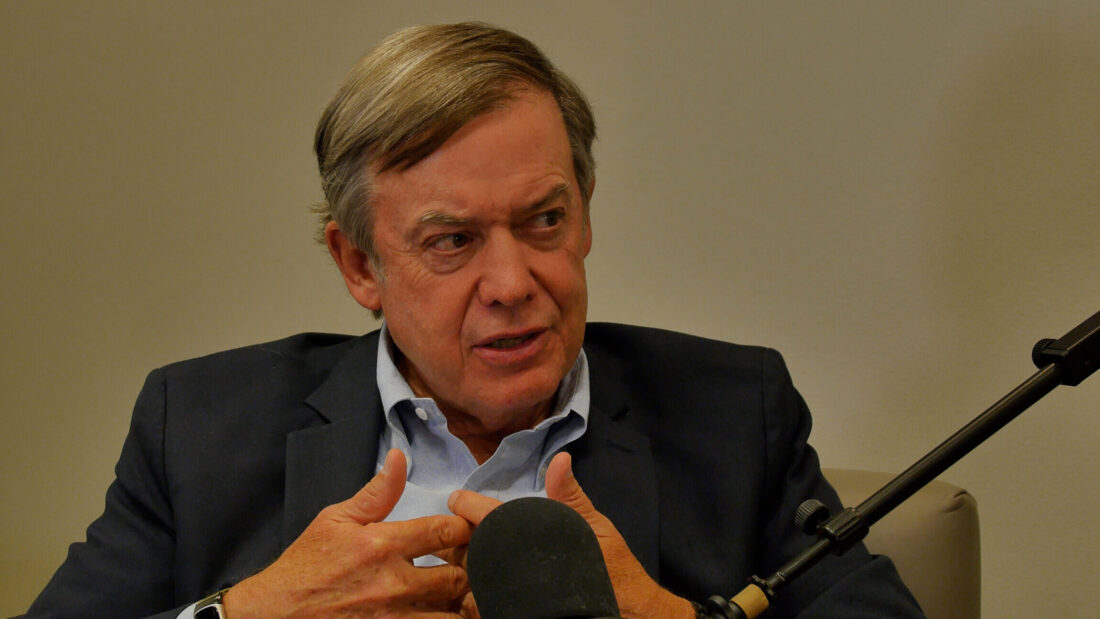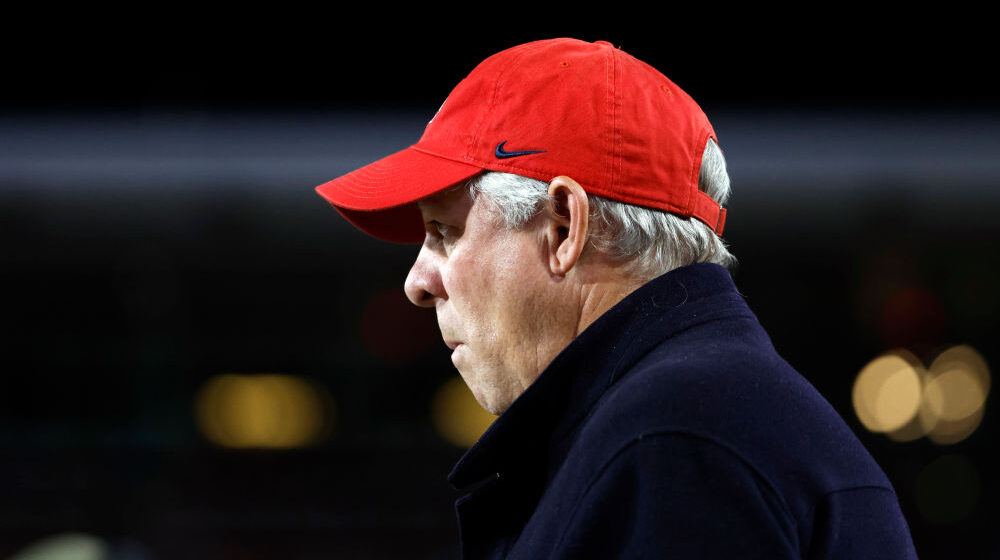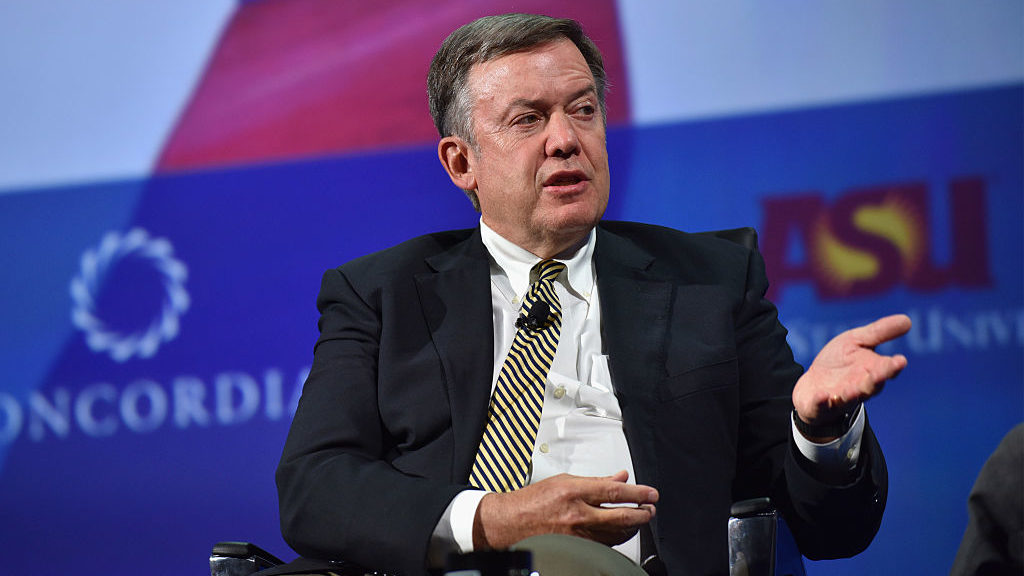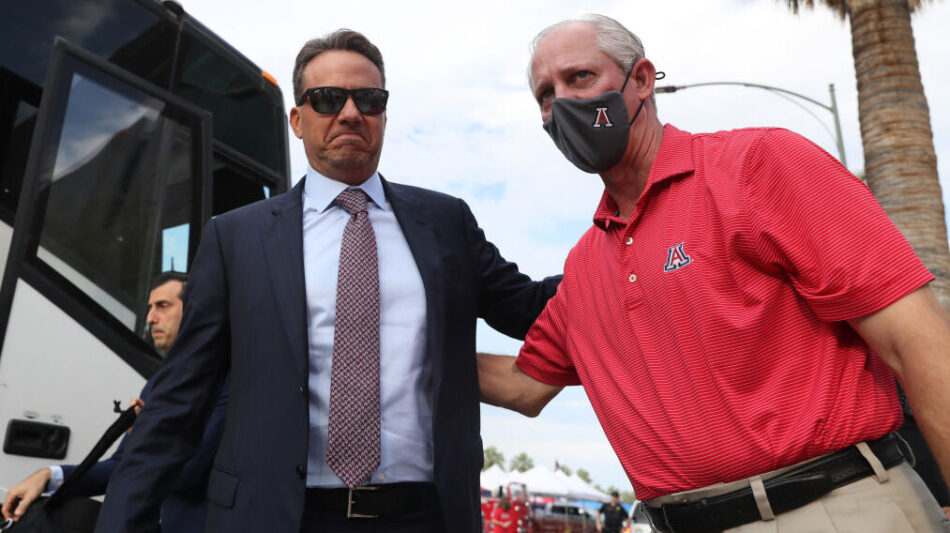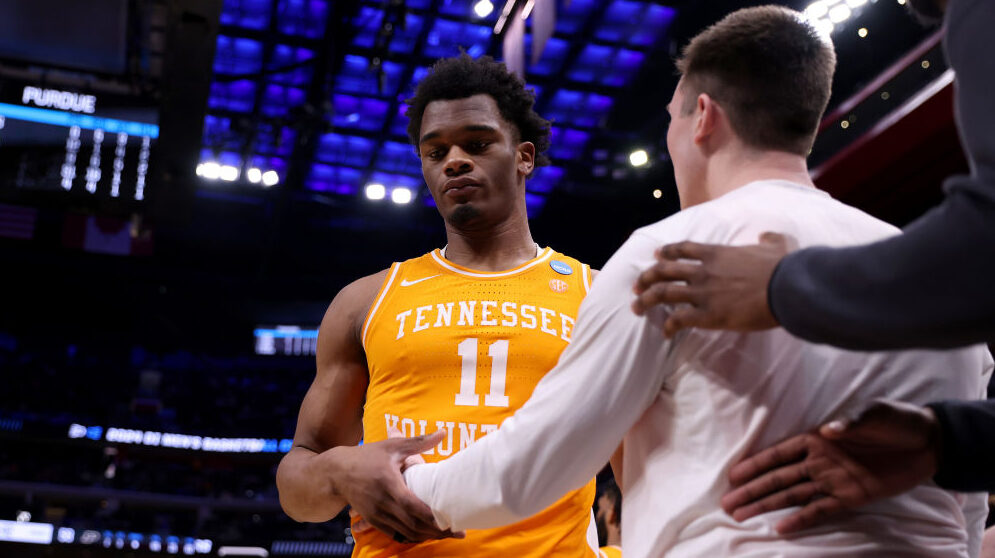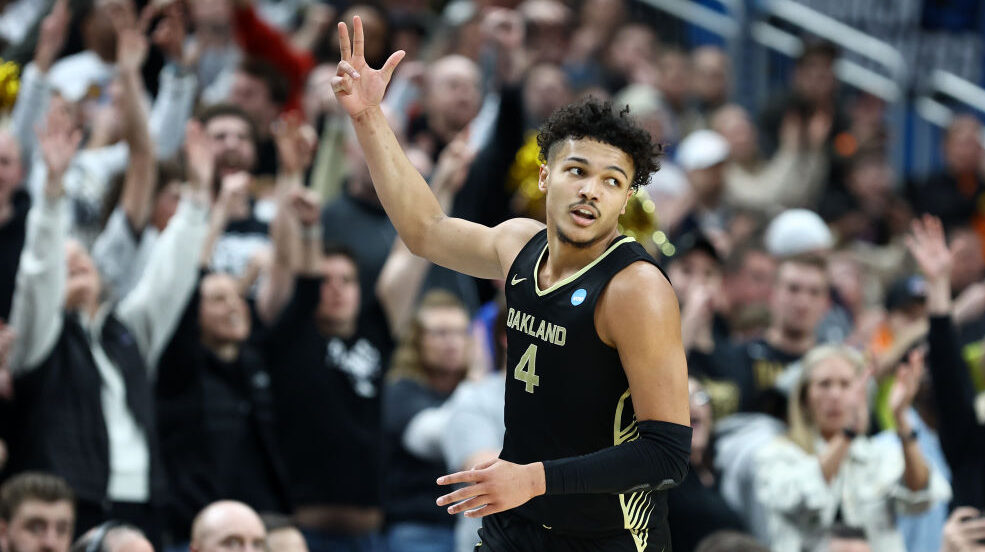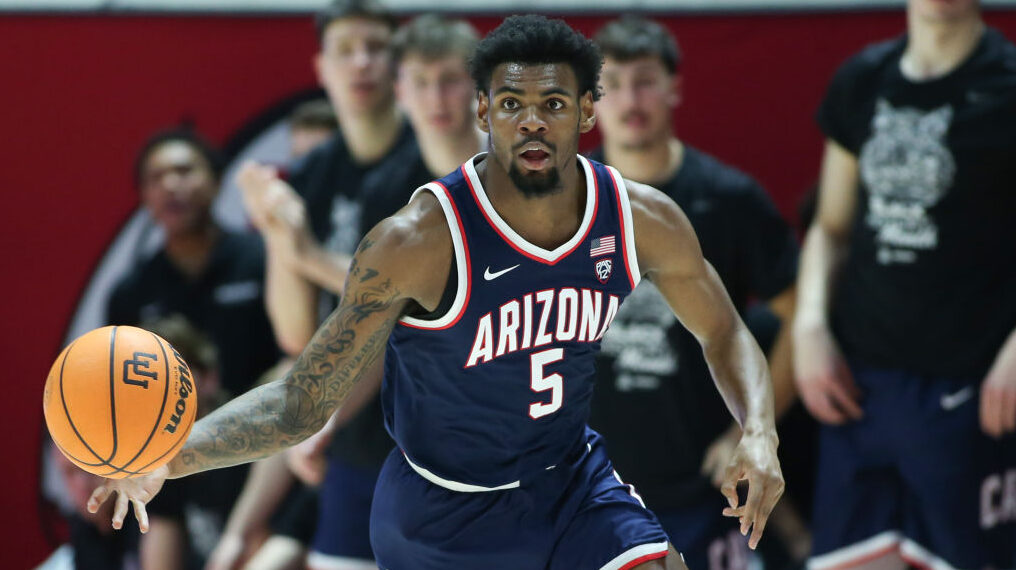Big 12 commissioner Brett Yormark brought urgency to TV deal that Pac-12 didn’t
Aug 16, 2023, 11:43 AM | Updated: 12:59 pm
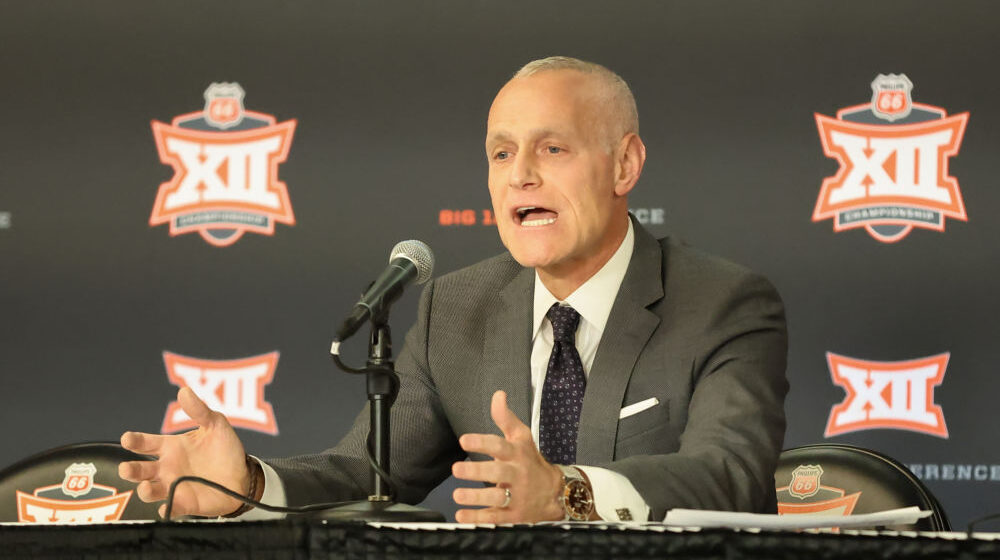
Big 12 Commissioner Brett Yormark talks before the opening game of the Big 12 Tournament basketball game on March 8, 2023 at T-Mobile Center in Kansas City, MO. (Photo by Scott Winters/Icon Sportswire via Getty Images)
(Photo by Scott Winters/Icon Sportswire via Getty Images)
The expansions of the Big 12 and Big Ten crumbled the Pac-12. It came down to one strategic thing: getting a television deal done sooner.
That might be obvious.
Pac-12 commissioner George Kliavkoff spun his conference’s tires for more than a year trying to get what he thought was deserving value on a new media deal. The Action Network’s Brett McMurphy and long-time Pac-12 reporter John Canzano reported that the league rejected an offer with ESPN that would paid each school $30 million and countered by asking for $50 million, at which point ESPN dropped out of negotiations.
But Big 12 commissioner Brett Yormark got a new TV contract with ESPN and Fox done about two months after he officially became commissioner. The deal leapfrogged the Pac-12 in getting a new media agreement done and will pay out $31.7 million per school, including Pac-12 defectors Arizona State, Arizona, Utah and Colorado.
Yormark, who made rounds with local newspapers and The Marchand and Ourand Sports Media Podcast on Tuesday, admitted there was luck in his differing approach. He maybe took less money and admits digital-first could be the best distribution strategy down the line when the Big 12 is back into media negotiations in 2030.
But that’s not the now.
“We went into the market, as you know, very quickly and by October we had effectively put together a deal with ESPN and Fox, had a verbal agreement,” Yormark told the podcast. “It was the right thing to do because it became a catalyst for everything we’ve done since then, whether it’s creating new (intellectual property), new events, the Oklahoma-Texas solution and then ultimately expansion.
“It was the No. 1 catalyst. At the time, I didn’t realize that was the last big (TV) deal that was available, media deal, especially in our industry of college athletics.”
Why was the Pac-12’s strategy to land a TV deal so different from the Big 12’s?
With a different approach, Kliavkoff wanted to convince school presidents that a digital-first contract with Apple with a base of $23 million in payouts per school was forward-thinking — though maybe that was only the best proposal left on the table when the conference effectively dissolved.
The difference in the base proposal from Apple and risk of not reaching enough subscriptions to inflate each school’s earnings made the Big 12’s linear TV deal a more stable option to the likes of ASU and Arizona.
Yormark admitted he might’ve taken his own risk in rushing a media deal to lock in the conference’s stability.
“Digital distribution might be something that will play a big role in that next TV cycle but right now we wanted linear, we wanted exposure, we wanted marketing, we wanted ESPN and Fox,” Yormark said. “I said if I could get a good deal — maybe not a great deal but a good deal — we were going to go early. And my board felt the same way and we did it.
“I’m glad we did. Sometimes in life, you got to get lucky and we got a little lucky.”
Yormark, who has been on the job nearly a year, said he’s reached the three main objectives he laid out when he became commissioner in August 2022.
The former NBA, NASCAR and Roc Nation executive wanted to get a TV deal done early to stabilize the conference and “give us a foundation for the future.” He also wanted to keep Oklahoma and Texas from jumping from the Big 12 to the SEC before 2024 and, finally, to pursue expansion.
He checked those boxes with the Four Corner schools joining the Big 12 for the 2024-25 academic year.
Will the Big 12 expand more? What’s next?
Yormark said Big 12 expansion is “done” after also pursuing schools like UConn and Gonzaga to enhance what he called “arguably” the top basketball conference in college.
He improved the men’s and women’s hoops products with Arizona, while also helping bolster football. The Utes are an annual contender in the disintegrating Pac-12 South, and Arizona State and Colorado carry “sleeping giant” labels for differing reasons.
“We doubled down on basketball while also improving football. I’m really excited,” Yormark said. “We’re the deepest conference I think in America when it comes to football. But arguably, we are the No. 1 conference in basketball. And basketball also is a catalyst for me to do a lot of different things.”
The Big 12 has already begun scheduling men’s and women’s basketball games in Mexico — one would assume the Arizona schools might be the first of the newcomers to join that plan.
Yormark earned credit for revamping the basketball tournaments in Kansas City, bringing them something closer to the Pac-12’s event in Las Vegas while adding more revenue streams with things like premium seating.
Yormark additionally mentioned to the Arizona Daily Star that possibilities in Las Vegas are on the radar.
Does Yormark feel for Kliavkoff?
All of the change, however, came at the expense of an entire Power Five conference and forced Yormark’s colleague, Kliavkoff, into scrambling to keep his brand from being a piece of history.
The Pac-12 enters its final season with only four schools left after this coming year: Cal, Stanford, Oregon State and Washington State.
“What I have learned here during expansion — and still I do have a little bit of a knot in my stomach — I never want my gain to be someone else’s loss,” Yormark said. “On the heels of not Colorado but all four-corner schools coming, I texted George, reached out to him. Obviously, he was busy. He and I spoke last week.
“Effectively I said, ‘Hey, I’m sorry it came down to this and I’m sorry I put you in a tough position. This was something we had to do and something the board and key stakeholders encouraged. I’m sorry my gain is your loss.’ We had a very collegial conversation. George was fantastic.”


